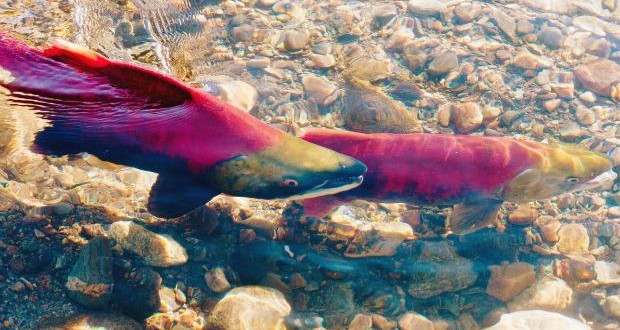A new scientific study shows that high concentrations of a variant of the most feared salmon virus in the world have been detected in Cultus Lake, near Chilliwack.
The paper published by the Virology Journal confirmed the discovery of a new European strain of infectious salmon anemia virus (ISAV) after tests on more than 1,000 farmed and wild fish, including cutthroat trout living in Cultus Lake.
The findings may provide new insight into impacts on Cultus Lake sockeye, considered Canada’s most endangered Fraser River sockeye population, say the reports authors, including researchers Alexandra Morton and Dr. Rick Routledge.
“This is going to be very uncomfortable for the salmon farming industry because this is an internationally reportable virus,” says independent biologist Alexandra Morton.
She says the trouble with infectious salmon anemia virus (ISAV) is it never remains dormant. “When it travelled from Norway to Chile, it sat dormant for about eight years. Then suddenly, in 2007, it just took off and infected so many farmed salmon, it caused $2-billion worth of damage.”
The virus genetic sequence was reportedly found in 72 per cent of the cutthroat trout in Cultus Lake, home to Canada’s most endangered Fraser River sockeye salmon population.
Morton tells us the big concern is mutation.
“Remember, influenza viruses mutate easily. [We’re worried] that we’re going to get a mutation that is going to damage our wild salmon stocks.”
She says the risk of an outbreak has the potential for severe consequences. “It is foolhardy to ignore viruses in the influenza family when you’ve got them in a feedlot animal.”
Morton points out the industry doesn’t allow anyone to test, and hopes that changes.
“When you find a European strain of virus and you had 30 million atlantic salmon eggs come into this country for the salmon farming industry, that’s the first place you’re going to look for this virus.”
Morton wants access to salmon farms.
“If they don’t have this virus in their farmed salmon, as they say, well then, let us go test. And then we’ll clear it up, one way or the other,” she adds.
Agencies/Canadajournal
 Canada Journal – News of the World Articles and videos to bring you the biggest Canadian news stories from across the country every day
Canada Journal – News of the World Articles and videos to bring you the biggest Canadian news stories from across the country every day



